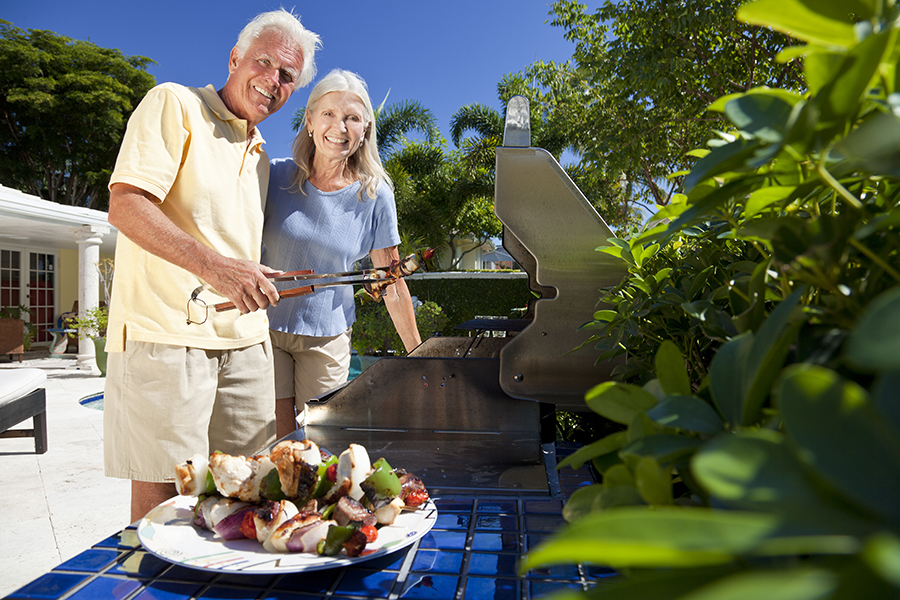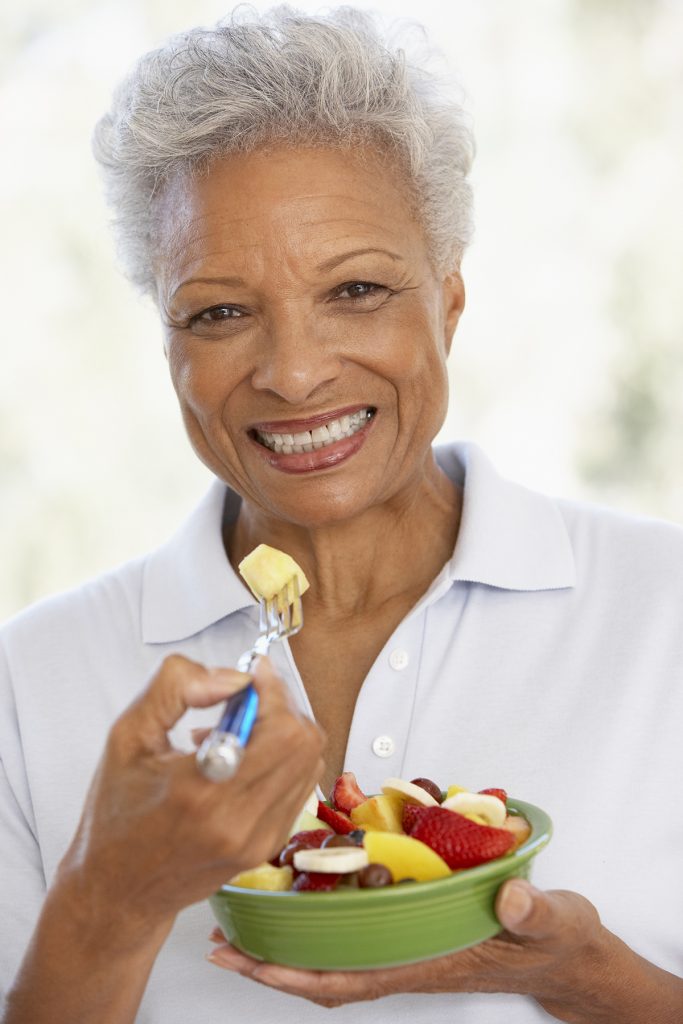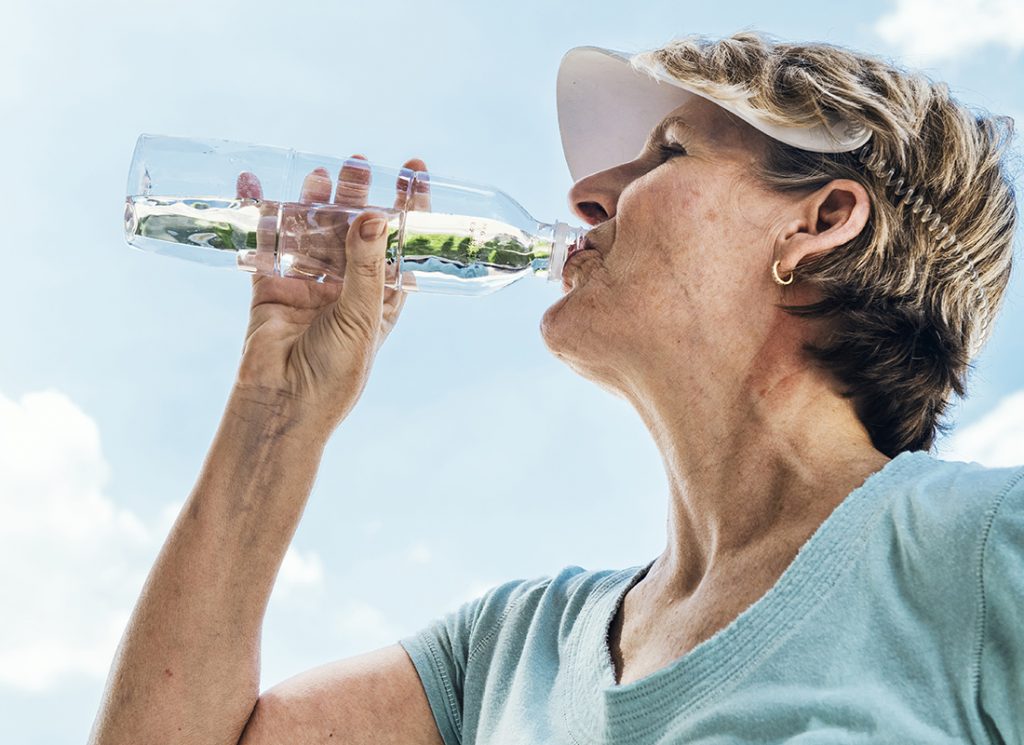Nutrition & Hydration
As we age, eating right can make a difference in our health and how we feel, and encourage a sense of well-being. All food and beverage choices matter. Focus on variety, amount and nutrition. Choose from all five food groups including fruits, vegetables, grains, protein foods and dairy.
Dehydration is ranked in the top ten most frequent reasons for Medicare hospitalizations. The average cost of this is nearly three thousand dollars. Half of all patients hospitalized with dehydration as the primary diagnosis, die within one year.
Barriers to Good Nutrition Habits
But sometimes it’s not easy to get the good nutrition and hydration we need. Ill-fitting dentures, illness, lessening sense of taste, smell and thirst, and low activity levels decrease healthy eating and drinking. The environment is also a factor. Noisy, poorly lit dining areas, uncomfortable seating and similar stresses reduce appetite.
Small Adjustments Improve Daily Eating Habits
- Add flavor to foods with spices and herbs instead of salt. Look for low-sodium packaged foods.
- Add sliced fruits and vegetable to meals and snacks. Look for pre-sliced fruits and vegetables on sale if slicing and chopping is a challenge.
- Ask your doctor for other options if your medications affect your appetite or desire to eat.
- Drink 3 cups of fat-free or low-fat milk throughout the day. If you can’t tolerate milk, try small amounts of yogurt, buttermilk, hard cheese or lactose-free foods.
- Drink water instead of sugary drinks.
- Consume foods fortified with vitamin B12, such as fortified cereals.
Seniors Need Adequate Protein
Let’s Make It Happen!
Your body needs enough protein to maintain its immune system and muscles. Without enough protein, your risk of infections, pressure sores, falls and broken bones increases.
Protein deficiency can cause problems with bruising, wound healing, dental health, fatigue and appetite. Foods high in protein usually require the ability to cook and chew which may be difficult for some seniors. However, if you eat more protein and fewer carbohydrates, you may lose some extra pounds.
How much protein should I eat?
Women should aim for 45 grams of protein per day. Men should get 60 grams. Speaking with a dietician may be helpful.
For reference, one egg white has 7 grams of protein, 1 string cheese has 8 grams, and a can of tuna or chicken has close to 40 grams.
Breakfast tip: Cook your hot breakfast cereal with low fat milk or soy milk instead of water (+8 grams).
Lunch Tip: Add ½ cup beans to your salad or soup (+6 grams).
Dinner Tip: Finish the protein on your plate before starting on the fruits, vegetables, starches and dessert.
Snack Tip: Add 1/4c of nonfat dry milk powder to your pudding or smoothie (+8 grams).
Drink Tip: Milk, yogurt, soy milk and protein smoothies can help you reach your protein goals.
Note! If you have kidney problems, ask your doctor about your protein needs
Getting Proper Nutrition?
Proper nutrition aids the function of the digestive, circulatory and nervous systems. It can ward off potential chronic health problems like diabetes, high blood pressure and high cholesterol.
Because your metabolism slows with age, it is important that the calories we take in, are from nutrient-rich foods. Here are some excellent choices!
- Healthy fats (seeds, nuts, avocados, fatty fish and vegetable oils) improve heart health.
- Whole Grains (brown rice, whole grain cereals and whole wheat bread) reduce blood cholesterol and are a good source of B Vitamins.
- Fiber (raw fruits and vegetables) aids digestion and helps alleviate constipation.
- Protein (beans, eggs, chicken, fish and lean meats) strengthens the immune system and muscles.
- Low-fat dairy foods (cheese, yogurt and milk) builds bones, teeth and red blood cell production
- Remember, healthy eating will also help you maintain a healthy weight and will work wonders for your energy level.
What Does Hydration Mean?
The hydration status of a person refers to their body water balance.
Are You Hydrated?
The body is normally made up of 60% water which falls to about 50% in seniors. Seniors drink less water because the sense of thirst decreases with age. Secondly, aging kidneys have decreased ability to concentrate urine. As a result, seniors are at risk for dehydration.
Water Is Important to Good Health
Drink fluids throughout the day in order to avoid:
- Memory/cognition problems
- Constipation problems.
- Muscle weakness and cramps
Medications may cause dehydration like some blood pressure and anti-depression medications. So, is it necessary to drink eight 8-ounce glasses of water daily? Maybe not because other medications retain water. Also fruits and vegetables contain fluids which keep you hydrated.
Tips for Staying Hydrated
- Don’t wait until you are thirsty to drink. By this time you are already dehydrated.
- Carry a water bottle with you and drink from it regularly.
- Drink at least eight cups of water every day.
- Keep a full water bottle in the refrigerator door and take a drink every time you open the refrigerator.
- Drink extra in extreme heat to replace the water lost from sweating.
- Start and end the day with a cup of water.
- Do not replace water with alcohol or caffeinated drinks.
- Know the symptoms of dehydration










Comments are closed.